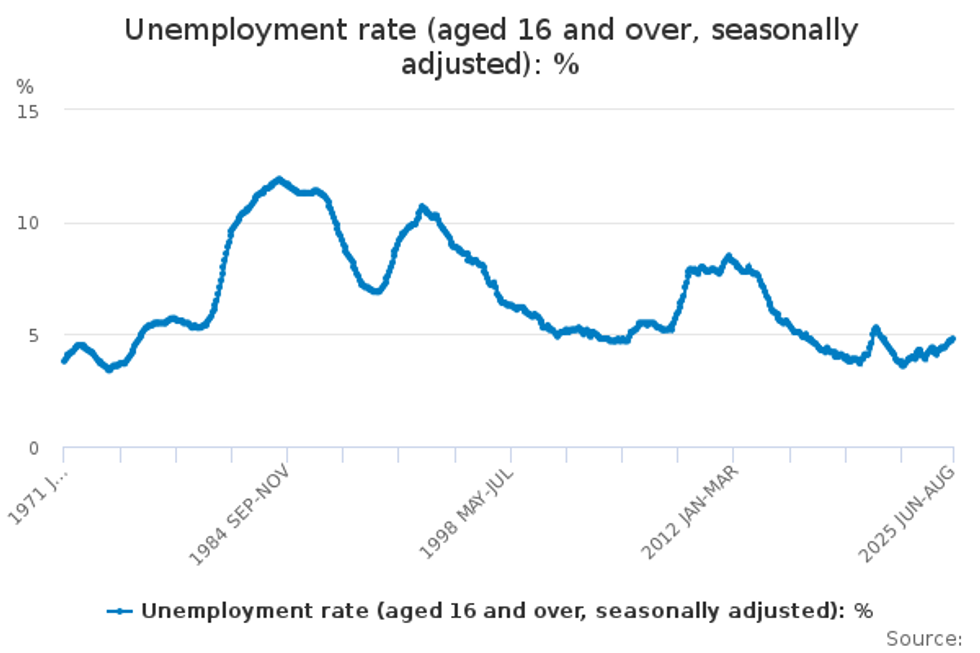Unemployment in the UK rose to 4.8 per cent in the three months to August, the Office for National Statistics has said.
That sees the figure rise by 0.1 per cent since July.
The announcement will come as a blow to Rachel Reeves.
Consensus expectations, cited by FXStreet, had pointed to a steady reading of 4.7 per cent.
According to the ONS, the number of payrolled employees in the UK fell by 93,000 compared with August last year, though it rose by 10,000 on the month.
Its early estimate for September, which it notes is subject to revision, suggests a year-on-year decline of 100,000 and a monthly drop of 10,000, bringing the total to 30.3 million.
“The estimated number of vacancies in the UK fell by 9,000 (1.3 percent) on the quarter, to 717,000, in July to September 2025. This marks the 39th consecutive period of quarterly decline,” the ONS said.
Annual growth in regular earnings, excluding bonuses, eased to 4.7 per cent in the three months to August, down from 4.8 per cent in the previous period.
Liz McKeown, director of economic statistics at the ONS, said that after a prolonged period of subdued hiring, there are signs the declines in payroll numbers and vacancies may be stabilising.
She noted varying trends across age groups, with record levels of employment among over-65s, while the rise in unemployment was largely concentrated among younger people.
Despite the weak hiring backdrop, wage growth has remained resilient.
The ONS has warned that the latest figures should be treated with caution as it continues to overhaul its labour market survey methodology.
Despite signs of stabilisation, with a 10,000 rise in payrolled employees between July and August, early estimates suggest a 10,000 fall in September, bringing the total to 30.3 million.
This comes after retail sales growth slowed in September, as rising inflation and uncertainty around the Chancellor’s upcoming Budget weighed on household spending.
Figures from the British Retail Consortium and KPMG showed total sales rose by 2.3 per cent year on year, slightly above the 12-month average, though food sales were driven more by price increases than volume.
Business groups have warned that fears of tax hikes in Rachel Reeves’ Budget are dampening growth and hiring.
Meanwhile, the Institute for Fiscal Studies has proposed a one-off wealth tax as a more efficient way to raise revenue, arguing it would avoid distorting future behaviour.
Unite general secretary Sharon Graham responded to the latest unemployment figures with a stark warning about the consequences of continued underinvestment in UK industry.
She argued that without a co-ordinated industrial strategy backed by serious financial commitment, workers risk being “thrown on the scrap heap” as unemployment rises.
Ms Graham contrasted the UK’s approach with that of Germany, which she said is investing heavily in its industrial base, leaving Britain lagging behind.
She also criticised the government’s net zero transition plan, describing it as “failed” and warning that chronically low investment is leading to a jobless transition.

Capital Economics said the persistence of wage growth in the latest data is unlikely to persuade the Bank of England to lower interest rates again this year.
The consultancy noted that while payroll employment and job vacancies saw modest declines in September, indicating a gradual loosening in the labour market, wage growth continues to ease only slowly.
As a result, it expects the Bank to remain more focused on the upward risks to inflation than on any slowdown in economic activity.
Capital Economics added that it is “only a matter of time” before further labour market softening leads to a more pronounced slowdown in wage growth, potentially paving the way for interest rates to fall from 4 per cent to 3 per cent next year.
Ben Harrison, Director of the Work Foundation at Lancaster University, said the latest labour market figures pose serious challenges for ministers aiming to “Get Britain Working” and “Make Work Pay.”
He warned that after a difficult first half of the year, competition for jobs is intensifying, with more people seeking work as vacancies continue to decline.
Unemployment has risen by 297,000 over the past year, now reaching 4.8 per cent, while job openings have fallen for the 39th consecutive period.
Mr Harrison highlighted the disproportionate impact on younger workers, noting that 12 per cent of 18 to 24-year-olds are unemployed, including 112,000 who have been out of work for more than a year.
“Ministers must learn from previous attempts to tackle long-term youth unemployment and ensure they support – not sanction – young people into real, paid opportunities,” he said.
He added that participants must be given “agency to make decisions that benefit their future careers and health.”

Our Standards:
The GB News Editorial Charter
Turning to pay, Mr Harrison said “real pay growth appears to be on borrowed time,” having fallen to 0.6 per cent — the lowest level in two years.
Despite headline wage growth of 4.7 per cent, he said “persistently high inflation, and in particular surging food prices, has left one in six workers (17 per cent) reporting they struggle to pay their bills each month.”
“Against this backdrop, the Chancellor faces a series of difficult choices in her forthcoming Budget statement,” Mr Harrison said, urging a continued focus on “boosting living standards and job opportunities in the years ahead.”
More to follow…







Follow